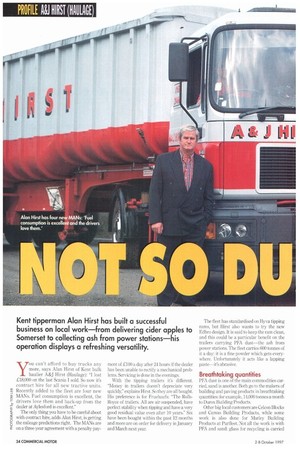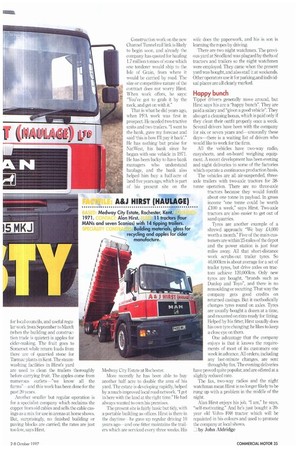y ou can't afford to buy trucks any more, says Alan
Page 36

Page 37

If you've noticed an error in this article please click here to report it so we can fix it.
Hirst of Kent bulk haulier A&J Hirst (Haulage): "I lost £18,000 on the last Scania I sold. So now it's contract hire for all new tractive units. Recently added to the fleet are four new MANs. Fuel consumption is excellent, the drivers love them and back-up from the dealer at Aylesford is excellent."
The only thing you have to be careful about with contract hire, adds Alan Hirst, is getting the mileage predictions right. The MANs are on a three-year agreement with a penalty pay
ment of £100 a day after 24 hours if the dealer has been unable to rectify a mechanical problems. Servicing is done in the evenings.
With the tipping trailers it's different. "Money in trailers doesn't depreciate very quickly" explains Hirst. So they are all bought His preference is for Fruehaufs: "The RollsRoyce of trailers. All are air-suspended, have perfect stability when tipping and have a very good residual value even after 10 years." Six have been bought within the past 12 months and more are on order for delivery in January mid March next year. The fleet has standardised on I lyva tipping rams, but Hirst also wants to try the new Edbro design. It is said to keep the ram clean, and this could be a particular benefit on the trailers carrying PFA dust—the ash from power stations. The fleet carries 600 tonnes of it a day: it is a fine powder which gets everywhere. Unfortunately it acts like a lapping paste—it's abrasive.
Breathtaking quantities
PFA dust is one of the main commodities carried, sand is another. Both go to the makers of building and paving products in breathtaking quantities: for example, 14,000 tonnes a month to Durox Building Products.
Other big local customers are Celcon Blocks and Camas Building Products, while some work is also done for Marley Building Products at Purtleet. Not all the work is with PFA and sand: glass for recycling is carried for local councils, and useful regular work from September to March (when the building and construction trade is quieter) is apples for cider-making. The fruit goes to Somerset while return loads from there are of quarried stone for Tarmac plants in Kent. The steamwashing facilities in Hirst's yard are used to clean the trailers thoroughly before carrying fruit. The apples come from numerous outlets—"we know all the farms—and this work has been done for the past 20 years.
Another smaller but regular operation is for a specialist company which reclaims the copper from old cables and sells the cable casings as a mix for use in arenas at horse shows. But, surprisingly, no finished building or paving blocks are carried; the rates are just too low, says Hirst. Construction work on the new Channel Tunnel rail link is likely to begin soon, and already the company has quoted for hauling 1.7 million tonnes of stone which one tenderer would ship to the Isle of Grain, from where it would be carried by road. The size or competitive nature of the contract does not worry Hirst. When work offers, he says: "You've got to grab it by the neck, and get on with it."
That is what he did years ago, when PEA work was first in prospect, He needed two tractive units and two trailers. "[went to the bank, gave my forecast and said this is how HI pay it hack'." He has nothing but praise for NatWest, his bank since he began with one vehicle in 1971. He has been lucky to have bank managers who understand haulage, and the bank also helped him buy a half-acre of land five years ago, which is part of his present site on the Medway City Estate at Rochester.
More recently he has been able to buy another half acre to double the area of his yard. The estate is developing rapidly, helped by a much-improved local road network, "I got in here with the land at the right time." He had always wanted to own his premises.
The present site is fairly basic but tidy, with a portable building as offices. I first is there in the daytime he gave up regular driving 10 years ago and one fitter maintains the trailers which are serviced every three weeks. His wife does the paperwork, and his is son is learning the ropes by driving There are two night watchmen. The previous yard at Srodlancl was plagued by thefts of tractors and trailers so the night watchmen were employed. They came when the present yard was bought, and also staff it at weekends, Other operators use it for parking,and places are all clearly marked.
Happy bunch
Tipper drivers generally move around, but Hirst says his are a "happy bunch". They are paid a salary and "giver a good vehicle". They also get a cleaning bonus, which is paid only if they clean their outfit properly once a week. Several drivers have been with the company for six or seven years and—unusually these days—there is a waiting list of drivers who would like to work for the firm.
All the vehicles have two-way radio, easysheets, and on-board weighing equipment. A recent development has been evening and night deliveries to some of the factories which operate a continuous production basis.
'The vehicles are all air-suspended, threeaxle trailers with two-axle tractors for 38tonne operation. There are no three-axle tractors because they would forefit about one tonne in payload. In gross income "one tonne could be worth £100 a week," says Hirst. Two-axle tractors are also easier to get out of sand quarries.
Tyres are another example of a shrewd approach: "We buy £4,000 worth a month." Five of the main customers are within 25 miles of the depot and the power station is just four miles away. All that short-distance work scrubs-out trailer tyres. So 46,000km is about average for a set of trailer tyres, but drive axles on tractors achieve 120,000km. Only new tyres arc bought, "brands such as Dunlop and Toyo", and there is no remoulding or recutting. That way the company gets good credits on returned casings. But it methodically changes tyres round on axles. Tyres are usually bought a dozen at a time, and mounted on rims ready for fitting Helped by his fitter, Hirst usually does his own tyre changing: he likes to keep a close eye on them.
One advantage that the company enjoys is that it knows the requirements of most of its customers one week in advance. All orders, including any last-minute changes, are sent through by fax. The evening deliveries have proved quite popular, and are offered at a slightly reduced rate.
The fax, two-way radios and the night watchman mean Hirst is no longer likely to be rung up with a problem in the middle of the night.
Alan Hirst enjoys his job. "I am," he says, "self-motivating." And he's just bought a 20year old Volvo P88 tractor which will be repainted in his colours and used to promote the company at local shows.
.1 by John Aldridge








































































































